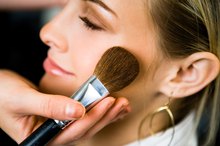What does fact checked mean?
At Healthfully, we strive to deliver objective content that is accurate and up-to-date. Our team periodically reviews articles in order to ensure content quality. The sources cited below consist of evidence from peer-reviewed journals, prominent medical organizations, academic associations, and government data.
- Mayo Clinic: Sunscreen-Answers to Your Burning Questions
- National Institutes of Health: Investigation of Micronized Titanium Dioxide Penetration in Human Skin Xenografts and its Effect on Cellular Functions of Human Skin-derived Cells
- National Institutes of Health: Investigation of Micronized Titanium Dioxide Penetration in Human Skin Xenografts and its Effect on Cellular Functions of Human Skin-derived Cells
The information contained on this site is for informational purposes only, and should not be used as a substitute for the advice of a professional health care provider. Please check with the appropriate physician regarding health questions and concerns. Although we strive to deliver accurate and up-to-date information, no guarantee to that effect is made.
Health Effects of Using Titanium Oxide in Skin Cream
Titanium oxide, better known as titanium dioxide, is a physical sunscreen that reflects UV light before it can damage your skin, according to MayoClinic.com. It is a common ingredient in sun protection creams. It has a white appearance when applied to skin. Some products have formulations that blend more with skin tones. Overall, titanium dioxide in skin creams has a positive effect on the upper dermis of the skin with few negative health effects 4.
Cancer Preventive
The biggest health effect of using titanium dioxide creams is reduced risk of skin cancer 4. More than 2 million cases of skin cancer occur each year, notes the American Academy of Dermatology 23. Sunburns are associated with increased risk for melanoma, which is the deadliest form of skin cancer. Titanium dioxide is one of the sunscreen ingredients recommended by the American Academy of Dermatology 23. It is not a chemical sunscreen and therefore nonreactive for people allergic to chemical sunscreens.
Possible Cellular Effects
What Are the Dangers of Methylparaben?
Learn More
Titanium dioxide does not penetrate normal skin 4. On the other hand, if skin is lacerated or otherwise exposed, micronized titanium dioxide can cause detrimental cellular effects 4. A study published in the August 17, 2008, issue of “Experimental Dermatology” investigated micronized titanium dioxide effects on human skin transplanted to mice. Researchers found that on intact skin, the micronized titanium dioxide did not penetrate into the cells. However, when exposed directly to cell cultures, the researchers found significant cell-type dependent effects on cellular functions such as viability; proliferation; apoptosis, or cell death; and differentiation. The research team concluded that there is a risk factor with micronized titanium dioxide products on impaired skin.
- Titanium dioxide does not penetrate normal skin 4.
- Researchers found that on intact skin, the micronized titanium dioxide did not penetrate into the cells.
Possible Skin Irritant
Titanium dioxide may be a mild skin irritant in some people. Canadian Centre for Occupational Health and Safety researchers tested five volunteers with an application of 0.1mg of titanium dioxide powder once daily for three days 5. The powder was used on both intact and damaged skin. The results produced almost no irritation in any of the volunteers. The researchers concluded that titanium dioxide is well-tolerated and at most a mild irritant to some.
- Titanium dioxide may be a mild skin irritant in some people.
- The researchers concluded that titanium dioxide is well-tolerated and at most a mild irritant to some.
Related Articles
References
- Mayo Clinic: Sunscreen-Answers to Your Burning Questions
- American Academy of Dermatology: Facts About Suncreens
- American Academy of Dermatology: Sunscreen
- National Institutes of Health: Investigation of Micronized Titanium Dioxide Penetration in Human Skin Xenografts and its Effect on Cellular Functions of Human Skin-derived Cells
- Canadian Centre for Occupational Health and Safety: 2-Health Effects of Titanium Dioxide
- IARC Working Group on the Evaluation of Carcinogenic Risks to Humans. "Carbon black, titanium dioxide, and talc. IARC monographs on the evaluation of carcinogenic risks to humans.” World Health Organization, International Agency for Research on Cancer, Vol 93, 2010.
- Lomer MC, Grainger SL, Ede R, et al. "Lack of efficacy of a reduced microparticle diet in a multi-centred trial of patients with active Crohn’s disease." Eur J Gastroenterol Hepatol. 2005;17:377–384.
- Lomer MC, Harvey RS, Evans SM, et al. "Efficacy and tolerability of a low microparticle diet in a double blind, randomized, pilot study in Crohn’s disease." Eur J Gastroenterol Hepatol 2001;13:101–106.
- Ruiz PA, Morón B, Becker HM, et al. "Titanium dioxide nanoparticles exacerbate DSS-induced colitis: role of the NLRP3 inflammasome.” Gut. 2017 Jul; 66: 1216–1224.
- Weir A, Westerhoff P, Fabricius L, Hristovski K, von Goetz N. "Titanium dioxide nanoparticles in food and personal care products.” Environ Sci Technol. 2012 Feb 21;46:2242-2250.
Writer Bio
Caroline Thompson is a professional photojournalist who has been working for print and online publications since 1999. Her work has appeared in the "Sacramento Bee," "People Magazine," "Newsweek" and other publications. She holds a Bachelor of Arts in photojournalism from California State University at Hayward and a personal trainer certification from the university's Health and Fitness Institute.









